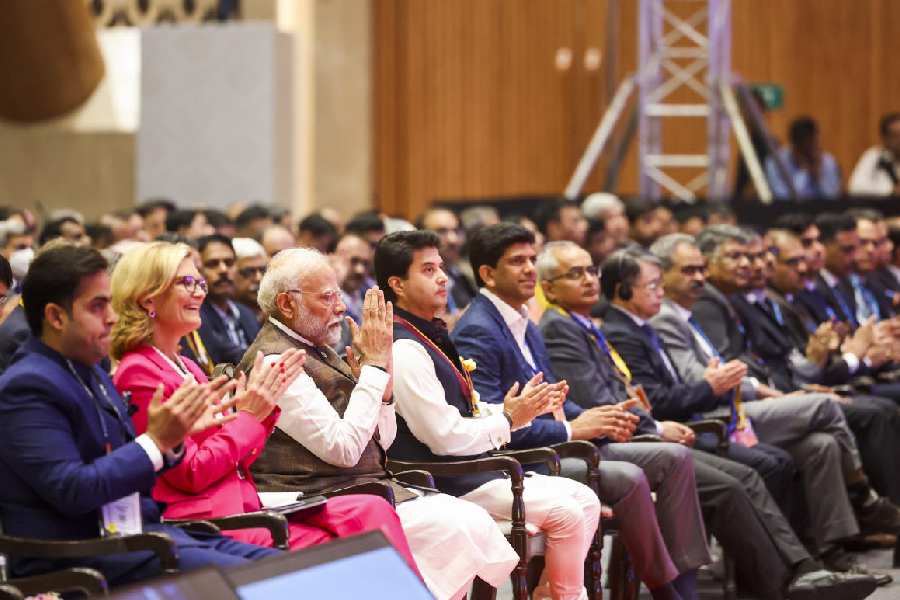Elon Musk has butted heads with Mukesh Ambani in what is being billed as a Battle of the Billionaires over the Narendra Modi government’s controversial plan to allocate spectrum for high-speed satellite-based broadband services in India.
Mukesh Ambani-owned Reliance Jio tore into the plan last week, terming it unfair to legacy telecom players who have already paid boatloads of money to acquire scarce radio waves in order to provide a range of voice, text, data and high-speed internet services.
Musk slammed the demand for an auction route for spectrum allotted for satcom broadband services. Writing on X, he said “any decision to auction would be unprecedented”.
Just when the battle between the rivals threatened to escalate, the government said it will allot spectrum for satellite broadband administratively and not via auction.
Late on Tuesday evening, telecom minister Jyotiraditya Scindia said at the India Mobile Congress event that the spectrum would be allotted administratively to the satcom broadband players and added that telecom regulator Trai was currently working out the pricing which is likely to be linked to a small percentage of the annual revenues they earn.
In a consultation paper on the subject floated last month, Trai had said: “Satellite spectrum is generally assigned through an administrative mechanism internationally. The spectrum charges are levied in the form of an administratively determined fee.”
The methodology of awarding spectrum for satellite services in India – a market poised to grow 36 per cent a year and reach $ 1.9 billion by 2030 — has been a contentious issue since last year.
Musk’s Starlink argues administrative allotment of licences is in line with a global trend, while Reliance, led by Mukesh Ambani, says an auction is needed to ensure a level playing field and as there are no provisions in Indian law on how individuals can be provided satellite broadband services.
On Tuesday, Bharti Airtel founder and chairman Sunil Bharti Mittal joined Ambani in demanding allocation of spectrum for satcom services in the same manner as it is allocated to telecom players.
Mittal, who spoke before Scindia at the Mobile Congress, said satellite companies planning to offer services to urban customers must be held to the same regulatory standards as telecom companies.
“Those satellite companies with ambitions to serve urban areas and elite retail customers must obtain telecom licences and adhere to the same conditions as everyone else,” said Mittal, whose company is India’s second-largest telecom operator.
Mittal stressed that established telecom firms will bring satellite services to India’s remote regions, but those entering urban markets should “buy spectrum like telecom companies and pay the required licence fees.”
An Airtel release in the evening clarified that Mittal’s support for spectrum purchase did not indicate that the company has changed its position on the contentious issue.
Airtel has always supported the ushering in of satcom services in remote regions of the country for maritime services, aviation, defence and security needs as also for disaster recovery activities.
The release said Airtel had written in a letter to the Department of Telecom in March supporting the administrative allocation of spectrum.
But it insisted that spectrum assignment should be allowed only when satcom services “act as a complementary service to terrestrial communication services in bridging digital inclusion gap and/or servicing the specific use cases of non-retail customers such as defense, cellular backhaul or in rural and remote areas.”
In a letter to Scindia last week, Reliance Jio opposed the Trai consultation paper proposal to allocate satellite spectrum instead of auctioning it.
Reliance Jio wanted Trai to restart its consultation process, arguing that the current approach leans toward administrative allocation, which the company claims would undermine competitive fairness and violate the Telecommunications Act of 2023, which stipulates that auctions should be the primary method for spectrum allocation.
Musk’s Starlink, along with other global satellite players such as Amazon’s Project Kuiper, supports administrative allocation.
The Broadband India Forum, which represents satcom players, has opposed calls for a revision to the consultation process. It maintains that the Telecom Act allows for administrative allocation in cases like satellite communications.










